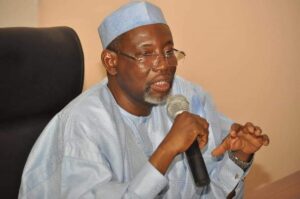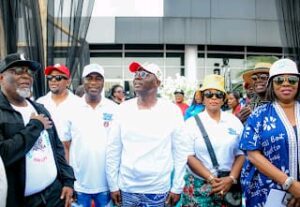World Meteorological Day: NiMet engages young minds, universities for effective service delivery
Joel Oladele, Abuja
As the World Meteorological Day was celebrated on Thursday across the globe, the Nigerian Meteorological Agency (NiMet) has described its partnership with young minds and universities across the country as a strategy to ensure an effective service delivery in the industry.
The Director General of NiMet, Professor Mansur Matazu disclosed this in his keynote address on the occasion marking this year’s celebration in Abuja on Thursday.
The DG said the agency, through the help of the Federal Government has invested in Meteorological data generation which are critical for past assessments and future predictions including nowcasting.
Speaking on the theme of this year’s celebration: “The future of weather, climate and water across generations,” Professor Mansur said human activities have contributed to the GreenHouse Gas (GHG) effects and stressed the need to prepare the future generation for the task ahead.
He added that most of the weather observers working with the agency are largely youths who began their careers in the field of meteorology at a very young age. This, he said, has led to the design and implementation of a catch them young programme called Young Meteorological Ambassadors.
“The Nigeria Meteorological Agency, therefore, on this day, Thursday March 23, 2023, joined the rest of the World in celebrating the 2023 World Meteorology Day. The National Meteorological and Hydrological Services (NMHSs), around the World have continued to monitor through observation (Air, Land and Water) the weather and climate, providing evidence of the changing climate and leading actions through prediction towards adaptation, mitigation and creation of resilient societies.
“Researchers including the Academia around the globe continuously monitor the ocean, the land and the atmosphere; modeling how they are changing, to deliver services that will support weather and climate predictions for Safety of Life over land, in the atmosphere and at Sea. Both observation and forecasting continue to improve with increasing technology and highly skilled personnel.
“ However, the warming trend and anthropogenic activities of humans towards GHG concentrations have continued the upward surge. Therefore, while we work tirelessly to improve on our activities, we must not forget to prepare the future generation for the task ahead.
“The Nigerian Meteorological Agency (NiMet), over the years, with support from the Federal Government of Nigeria has been investing in meteorological data generation over land, water and in the atmosphere. The data generated are so critical for past assessments and future predictions including nowcasting.
“In NiMet, we have placed special importance in the future generations by working with the young minds in the country. Usually, our weather observers are largely youths who begin their careers in the field of meteorology at a very young age. Similarly, we have designed, developed and implemented a programme called Young Meteorological Ambassadors whose members are here today.
“Can we please recognise the Members of the Young Met. Ambassadors. While with the Young Met. Ambassadors, the Agency does not neglect the University community. We have signed Memorandum of Understandings (MoUs) with several universities in Nigeria to promote the science of meteorology within the academic institutions at tertiary level,” the DG said.
He also noted that NiMet has never failed in its efforts to support national and regional development which has helped in many ways, ranging from aviation to communication.
He added that the agency is also working towards preserving its past resources in terms of publications and instrumentation while developing new ones, thereby providing a robust knowledge base for the upcoming generations.
“To support national and regional development, NiMet continues to render services in support of aviation, agriculture, construction, tourism, defence, water resources management, telecommunications, environment, communications, etc.
“The development of our products and services includes the effective utilisation of young minds as well as the experience within the Agency creating innovations to what we do and how we do them. This has positively impacted on our routine publications and on-demand services such as the Seasonal Climate Prediction as part of the Agency’s meteorological Early Warning System in line with the United Nations Early Warning for ALL.
“Other products and services include Hydrometeorological Bulletin, Annual State of the Climate report in Nigeria, Agrometeorological Bulletin, Climate and Health Bulletin, Daily weather outlooks and bulletins, TV weather forecasts, Terminal Aerodrome Forecasts, Marine Bulletin, Impact-Based Weather Forecast, and multitudes of other routine and on-demand products and services cutting across all socio-economic sectors.
“As an Agency, we are also working to preserve our past resources in terms of publications and instrumentation while developing new ones, thereby providing a robust knowledge base for the upcoming generations.
“On this note, I therefore encourage us as institutions and individuals to invest in our future generations, creating awareness on the dangers of climate change such as extreme weather and loss of livelihoods; and providing opportunities for them to proffer solutions thereby making the World a safer place for All. We must catch them young,” he reiterated.
Every year on the 23rd of March, the World celebrates Meteorological Day. This ‘day’ commemorates the coming into force on 23rd March 1950 of the Convention establishing the World Meteorological Organisation.
Prior to this date, the International Meteorological Organisation existed since 1873, as a cooperation of international bodies or institutions working tirelessly together, exchanging data and making forecasts for the good of all.
Professor Mansur said, “This cooperation has been strengthened since the establishment of the World Meteorological organisation (WMO). Over the years, society as well as science has evolved. Technology has allowed us to modernise the way activities are conducted in a more concise and efficient manner.
“We have witnessed the transition from an analog society to a digital one, and the evolution is expected to continue. In the same way, the world climate has transited from variability to change while variability still continues within different climate environment.
“ The global atmosphere continues to warm while nations struggle to adjust to the reality of combating climate change amidst economic gains. The average concentration of greenhouse gases in the atmosphere continues to rise with devastating global consequences.
“It is very clear, however, that no country in the world is immune against the effect of the changing climate, whether as an emitter or non-emitter of these gases. Indeed, happenings over the years have taught us all that weather has no boundary.
“The world has seen ravaging storms cutting across several international borders during their lifecycles. This therefore echoes the essential of cooperation at the core of existence of the WMO.
“As an organisation of 187 Member States and 6 Member Territories, the WMO requires that all its members will operate with common vision and goals. The World Meteorological Day therefore, offers opportunity for member countries to converge ideas and resources; and align in one common thematic area.
“The ‘Day’ showcases the essential contribution of National Meteorological and Hydrological Services (NMHss) such as NiMet and NIHSA (Nigeria Hydrological Services Agency) to the safety and wellbeing of society and is celebrated with activities around the world,” the DG said.




